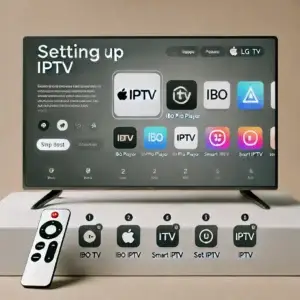IPTV is an amazing option for cordcutters but, without a VPN, geographical content restrictions will heavily limit what you can and can’t watch online. Today’s article discusses geo-blocks and how to beat them, what makes a good VPN, and how to use a VPN with Kodi to access live IPTV streams. Plus, we give you our top VPNs for unblocking your favorite IPTV streams anywhere in the world.
These days, you don’t need a cable or satellite subscription to enjoy a variety of TV channels in your home. Lots of people are opting to use online services on their computers as a replacement for traditional TV. After all, there are many drawbacks of cable subscriptions: they require you to buy bundles of channels that you may not be interested in, you often have to sign up for a long contract, and they can be very pricey. Instead, why not use the computer and internet connection that you likely already have in order to watch your TV?
Stay safe using IPTV and unblock foreign content libraries with these VPNs:
Watching live IPTV is one of the primary uses of Kodi. Unfortunately, many sources of live IPTV content available on Kodi are geo-blocked. This means they can only be accessed from certain locations. Any access from elsewhere will be blocked. A VPN can help you circumvent these restrictions by spoofing your location.
The most common way to watch TV online is through streaming on demand services like Netflix or Hulu, where you can watch old episodes of your favorite shows at whatever time you please. This is very convenient, as it means that you don’t have to tune in at a certain time to watch the shows you enjoy, and that you can binge a whole lot of a show if you have a lazy day off. However, you might want access to live TV too. If you like to watch time-sensitive content like the news or live sporting events, then you want to watch things as they air, not days or months later. And some people still enjoy the experience of turning on a TV channel and seeing what is on for them to watch at that time.
For these people, IPTV is the perfect choice. IPTV stands for Internet Protocol television, and it means accessing traditional TV content over an internet connection. So, for example, you can open up your IPTV program on your computer and then tune in to traditional TV channels like ABC, ESPN, or MSNBC. IPTV is great but there are some legal issues with its use that you should be aware of, and that’s why we recommend you get a VPN when you use IPTV. Read on to find out why you should use a VPN and to see our recommendations for the best VPN for IPTV.
A Virtual Private Networks or VPN provides users with privacy and security while using the Internet. They encrypt all data transmitted or received using strong algorithms that make it virtually it undecipherable. They are referred to as virtual because they establish a virtual tunnel between the protected device and a remote VPN server. All data in or out of the protected device is encrypted before being forced through the tunnel. At the far end, data is decrypted and sent out on the Internet. The encryption is such that only the VPN server can decrypt data from the client and vice versa.
RELATED READING: VPN Encryption Guide
But if it the data is decrypted and then sent on the Internet at the far end of the tunnel, how is it secure? This is a common question that we’ll try to answer. You get increased privacy because, even though the data is not encrypted between the far end of the tunnel and its destination, it is still untraceable to you or to your equipment. Once the data exits the tunnel, it is seen as originating from the VPN server, not from your computer.
But most importantly, someone (Internet Service Providers, government agencies or malicious users) trying to intercept your traffic and spy on you has to do that at your end. When using a VPN, this part of the communication is encrypted so anyone intercepting and examining your traffic would only see undecipherable data between you and a VPN server. They wouldn’t know where you’re going or what you’re doing.
There are lots of options for IPTV out there, so you can sign up to an IPTV service from a big range of providers. However, you should know that these services are illegal in some countries and grey legal in others. Often it is considered copyright infringement for providers to share the content of TV channels without permission. This is particularly an issue for popular premium cable channels like HBO and ESPN, which pay a great deal for exclusive rights to show certain popular dramas or sporting events.
This is a problem because if your ISP discovers that you are using an IPTV service then they could take actions against you. They could kick you off their network, leaving you without internet access, or they could even report you to law enforcement, in which case you could be faced with a fine or prosecution. Now, it is not that likely that this will happen to you, as legal action is taken much more often against the providers of IPTV than the users, but it is still a risk.
A more likely scenario is that your ISP may see that you are using up a lot of bandwidth due to all your streaming and they will throttle your connection, meaning that they will deliberately limit the amount of bandwidth which is available to you when you use certain websites or apps. This keeps your bandwidth usage down, but it means that your streams may load slowly or be interrupted due to insufficient bandwidth. Some ISPs even deliberately block all connections to known IPTV services.
To get around these issues, you can use a VPN. This works by encrypting all of the data that leaves your device, before it enters the network of your ISP. Because the data is encrypted, your ISP cannot see what sites or services you are accessing, and cannot know when you are using an IPTV service. This means that you are protected from legal issues when using IPTV, and that you can get around an throttling which your ISP might put in place. Using a VPN for your IPTV viewing will therefore both keep you safe and help you to have a more reliable and fast streaming experience.
All ratings are determined by our editorial staff. Learn more about how our brand review process works. Learn more.
All ratings are determined by our editorial staff. Learn more about how our brand review process works. Learn more.
All ratings are determined by our editorial staff. Learn more about how our brand review process works. Learn more.
All ratings are determined by our editorial staff. Learn more about how our brand review process works. Learn more.
All ratings are determined by our editorial staff. Learn more about how our brand review process works. Learn more.
Below we have recommendations for the best VPN providers to use for IPTV. In order to choose a VPN for recommendation for IPTV viewers, we consider the following factors:
With all of these factors in mind, here are the VPN providers that we recommend for IPTV viewers:
All ratings are determined by our editorial staff. Learn more about how our brand review process works. Learn more.
NordVPN is our top-recommended VPN for IPTV users, or really anyone who cares about their privacy online. We particularly like their array of specialty servers embedded within their massive network. For example, they have special servers for P2P downloads which are great for those users who like to download with torrents. There are more secure servers for very high levels of security like double VPN, in which your data is sent to two separate servers and is encrypted at each, and onion over DPN. There’s also an option for dedicated IP if you want an IP address that is unique to you instead of the shared IP address that you usually get with a VPN.
Even if you don’t use the special servers and just connect to a regular VPN server, you’ll still have high security features in place like the use of 256-bit encryption and a no logging policy. The connections are fast and can handle high definition video streaming with no problems. The server network was recently expanded to cover a massive 5,400 servers in 59 countries, and the software can be installed on devices running Windows, Mac OS, Linux, iOS, Chrome OS, Android, or Windows Phone.
Read our full NordVPN review.
All ratings are determined by our editorial staff. Learn more about how our brand review process works. Learn more.
Surfshark’s modernized feature set makes it one of the most capable VPNs for hiding your activity online. With 256-AES-GCM encryption, obfuscation on every server (of which there are 3200+ servers in 65 countries), built-in smart DNS, plus the unique NoBorders anti-censorship method, there’s basically no corner of the Internet you can’t access, safely and anonymously.
With all that protection, you’d think speeds would suffer; but the opposite is true. With cutting-edge tunneling, Surfshark minimizes encryption overhead for low-latency connections and buffer-free streams–even in HD.
We love Surfshark because to gives more and asks less. It’s a cheap VPN, yet offers unlimited simultaneous connections, a kill switch, adblocking and anti-malware, plus protection against IP, DNS, and even WebRTC leaks. Did we mention they’re based in the BVI, and thus are free to offer a truly transparent no-logging policy?
All ratings are determined by our editorial staff. Learn more about how our brand review process works. Learn more.
ExpressVPN is a hugely popular VPN among heavy internet users and streamers, thanks to its combination of fast connections, good security, and easy to use software. When you’re streaming IPTV you’ll find that the service really does live up to its name and that the connections are express fast. So you won’t have to put up with buffering or lag when you’re watching IPTV.
The high level of security includes features like the use of strong 256-bit encryption to prevent anyone from accessing your data, and a no logging policy so you can be sure that your data won’t be shared with any other organisation or company. Further security features include a kill switch option in the software which lets you choose to cut off your internet connection whenever the VPN connection goes down, so you’ll never use the unsecured connection by accident, and DNS leak protection to stop your ISP observing your online actions through your DNS activity.
The impressive server network covers more than 3,000 servers in 160 locations in 94 different countries, and the software can be installed on a range of platforms. This includes devices running Windows, Mac OS, Linux, and Android, and if you watch IPTV in your browser then you’ll appreciate the option to make use of the browser extensions for the Google Chrome, Mozilla Firefox, and Apple Safari browsers.
Read our full ExpressVPN review.
All ratings are determined by our editorial staff. Learn more about how our brand review process works. Learn more.
CyberGhost is the choice we recommend for IPTV users who are new to VPNs and who want a very simple, easy to use service. The CyberGhost software has a graphical user interface which makes it dead easy to set up the right kind of connection for your needs. You just choose the kind of activity you want to do: like surf anonymously, torrent anonymously, or unblock websites, then the options you need will all be automatically selected for you. We recommend that IPTV users choose the surf anonymously setting to protect themselves when watching IPTV. You don’t need to change any settings or select any options – you just connect and go.
The service also has the high level of security you would hope for, like the use of 256-bit encryption and a no logging policy. The server network that you’ll get access to covers an impressive 5,700+ servers in 90 countries, and the software is available for iOS, Android, Windows, and Mac OS.
Read our full CyberGhost review.
All ratings are determined by our editorial staff. Learn more about how our brand review process works. Learn more.
IPVanish is great for users who want advanced configuration options as well as blazing fast speeds. In addition to the essential security features of 256-bit encryption and a no logging policy, within the software you’ll find an advanced options tab which has configuration options that let you customise the security of your connection. You’ll find features like a kill switch, DNS leak protection, periodic IP address so that your IP address changes regularly, and DNS configuration.
The connections are super fast which is perfect for IPTV users as it won’t slow down your streams. The server network is large and covers more than 1,300 servers available in 60 different countries, and the software is available for devices running Windows, Mac OS, Linux, and Android.
Read our full IPVanish review.
All ratings are determined by our editorial staff. Learn more about how our brand review process works. Learn more.
PureVPN is a service that includes not only a VPN but also a whole bundle of security software. The VPN has the features that you need to stay safe when watching IPTV, with strong 256-bit encryption and a no logging policy. The connections are fast enough to stream video so your IPTV won’t be interrupted, and the server network you’ll get access to covers more than 2,000 servers in 140 different countries.
But the real advantage of PureVPN is all the security extras that you’ll get included in your subscription. This includes features like anti virus and anti malware protection, as well as an anti spam filter to keep your email inbox free from clutter. The options for app filtering means that you can send the data from just some apps through the VPN, and you’ll also find options for DDoS protection, a kill switch, dedicated IP, and a NAT firewall. The software is available for Windows, Mac OS, Android, iOS, and Android TV devices, plus browser extensions for the Chrome and Firefox browsers.
Read our full PureVPN review.
There are several benefits to using a VPN in addition to increased privacy and security. Bypassing restrictions imposed by service providers, academic institutions or workplaces is one of the primary reasons why people use them. More interesting when talking about IPTV, Accessing content that is limited to certain geographic locations is another popular use for a VPN. Circumventing a country’s Internet access restrictions is also one of the most common uses of Virtual Private Networks.
The primary advantage of using a Virtual Private Network is the increase in privacy and security. A VPN offers a very strong level of encryption that typically makes your data almost impossible to crack. You’ll be free to type in passwords, enter credit card numbers, do your online banking or access any sensitive site with no worries about identity theft. Protected by a VPN, any ill-intentioned person won’t be able to see anything you’re doing and steal your personal information.
There are countless places where there are restrictions on what you can do on the Internet. They are common in academic institutions, office environment and lots of public WiFi hotspots. Even some Internet Service Providers even certain website or types of traffic. There are many reasons why it’s done. It can be a way of limiting bandwidth usage, reducing time wasted by employees and students, protecting copyright owners or just for enforcing ethics or morality.
Although there can be several reasons for the restriction, the means employed to enforce them are usually similar. Using a VPN will normally allow you to circumvent them. We say normally because it does not always work. Using a VPN has become more and more popular in recent years. In reaction, many organizations have developed ways to block VPN traffic. In reaction, VPN client software has also gotten wiser and many providers’ client software have ways to make their traffic appear to be “normal”, thereby bypassing any VPN blocking. The best ones even do it with no user intervention.
There are countries with strict Internet usage restrictions. They’re often much worse than what you’d find in any common office or school. China, for example, has been known to block access to Western social networks such as Facebook, Twitter, or Instagram. Google searches are censored and the search results you get from China are different from what you’d get elsewhere. And China is just one example. There are other countries that impose similar restrictions. All use methods such as destination IP filtering, transparent proxying and a handful of other techniques to enforce these restrictions.
Considering that Governments and organizations use similar–if not identical means of enforcing restrictions, on can easily conclude that those same features of Virtual Private Networks that allow bypassing corporate, or institutional restrictions generally work for bypassing national ones. There’s one important difference, though. The consequences of bypassing country restrictions in some jurisdiction can be considerable. Make sure you’re aware of what the risks are before doing anything you might regret.
IPTV streams–or channels–are live streams from various broadcasters that are normally meant to be watched on the web using a browser. Several Kodi add-ons enable users to watch these streams right from within Kodi. Some add-ons specialize in certain types of streams such as sports or UK channels or USA channels.
From a VPN standpoint, they all have one thing in common, they send a video stream from the source server to your computer. Unfortunately, the same type of video streams is also used to stream illegal content to Internet users. For this reason, an Internet Service Provider monitoring its clients’ activities–they’ve been known to do that–could mistakenly think that someone watching perfectly legal IPTV is downloading illegal streams. When this happens, ISPs can react by sending copyright infringement notices, throttling down your bandwidth or even interrupting your service.
A VPN’s encryption will prevent your ISP from knowing what you’re doing or where you’re going online. The will only see unidentifiable data going to the address of the VPN server you’re using.
Geographic restrictions are very common with IPTV feeds. It has to do with broadcast rights and advertising revenue. Many of the live IPTV streams you can watch using Kodi are taken from its broadcaster’s website. Since broadcasters usually only have right to broadcast in a certain geographic area–which can range for a town or county to a whole country–they often block access to their live feed to users outside of their geographic area.
This way, the terms of the broadcasting contracts are respected and each broadcaster gets his share of advertising revenue, which is based on the number of viewers. So, if, for example, you’re in Canada and are watching a USA live IPTV stream, the Canadian broadcaster of the show you’re watching loses one viewer and the corresponding advertising revenue.
Many broadcasters use a technique called geo-blocking to ensure only users in a certain area can view their content. But what happens if you’re on vacation abroad and want to watch something from your home country?
Geographic restrictions are enforced based on source IP address. So, all you have to do to be able to access that geo-blocked content is to change your source IP address to one from an authorized region. A VPN does just that. All traffic reaching the destination will appear as coming from the VPN server’s IP address instead of your device’s. To access some content that’s only available, for example, in the US, all you have to do is choose a VPN server located in the US. Good VPN providers have servers in multiple countries–sometimes, over a hundred–and will allow you to pick where you want to connect.
It’s a good idea for all IPTV viewers to get a VPN, for the sake of both security from legal issues and in order to prevent your ISP from throttling your connection when you are streaming. In order to find an ideal VPN for your IPTV service, you should look for one with fast connections, many servers, support for multiple operating systems, and a high level of security. The five VPN providers that we’ve shared here all meet these requirements and would make a great addition to your IPTV service.
Do you use IPTV, or do you prefer streaming services like Netflix? And if you do use IPTV, have you tried out any of the VPNs that we mentioned above? Let us know how your experience has been in the comments below.
If you need a VPN for a short while when traveling for example, you can get our top ranked VPN free of charge. NordVPN includes a 30-day money-back guarantee. You will need to pay for the subscription, that’s a fact, but it allows full access for 30 days and then you cancel for a full refund. Their no-questions-asked cancellation policy lives up to its name.
PureVPN doesn’t unblock IPTV channels! They also claim that their app works on Fire TV, but it doesn’t and they claim that the 15-day money-back guarantee adverised on their site is for ‘a different product’. Stay away!
From personal experience would recommend nordvpn for IPTV and Netflix. Try to look for some coupons online they have some great offers….just found one today if someone is interested 75OFF
I’m looking for a good vpn service provider to stream us netflix content for a while now. At the moment trying out nord as they have a good reputation and so far so good, haven’t experienced any buffering or speed drops while using it, fingers crossed. It would be great if i’d be possible to choose a specific city that you want to connect but maybe in the future!
Your email address will not be published. Required fields are marked *
This site uses Akismet to reduce spam. Learn how your comment data is processed.
Chances are, we can find what you’re looking for:




